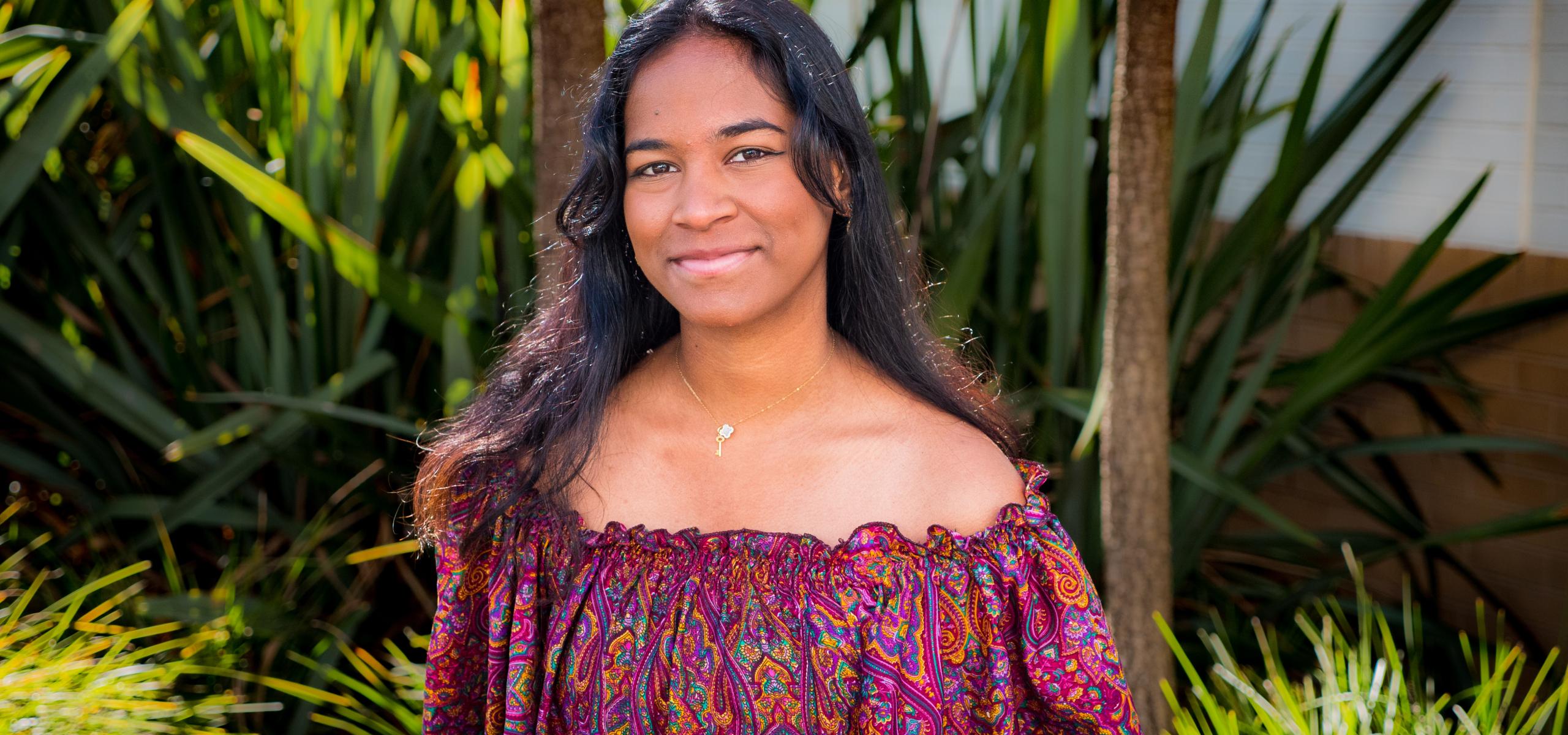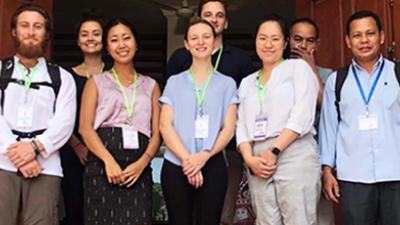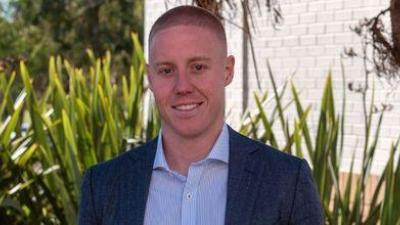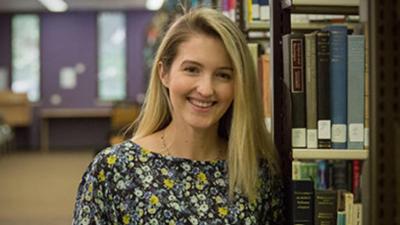
Degree
Bachelor of Arts/Law (Hons)
Degree type
Undergraduate
Favourite course
International Law
Growing up as a young carer and woman of colour, Satara Uthayakumaran witnessed the need for greater diversity in the legal profession.
Now in her third year of study at The Australian National University (ANU), Satara is determined to use her own voice to elevate overlooked issues in marginalised communities.
Currently studying a Bachelor of Laws (Honours)/Arts, Satara is also a youth ambassador for Anti-Slavery Australia, the youngest board member of the Domestic Violence Crisis Service (ACT) and a founding member of the ANU Women in Law Association.
In this Q&A, Satara reflects on her law school journey, experiences of imposter syndrome and future aspirations.
Why did you choose to study at ANU?
I chose to study at ANU, as it granted me a level of independence – living away from home for the first time - and an ability to navigate my own personal journey through university. I was also attracted to ANU because of its closeness to First Nations ways of learning and living. I was also interested in international issues and ANU had a strong focus in that area.
Why did you choose to study law?
As a young carer of someone with a severe disability and a woman of colour, advocating for the marginalised has always been a passion of mine. I often had to interact with complex administrative issues and appeals processes to do with the NDIS, and therefore saw the very real impacts of the law.
Coming from a very intersectional community, I keenly felt the need for more diverse voices in the law, and therefore made the choice to use my education to elevate overlooked issues in marginalised communities.
What was your dream job as a child?
My dream job as a child was to be an astronaut! The idea of exploring the endless expanse of space and constantly discovering new things about the universe seemed so exciting to me.
What area/s of law interest you the most and why?
An area of law that interests me is international law, given I enjoy the challenge of navigating both diplomacy and national sovereignty. I’m also drawn to family and criminal law – particularly because of my current work in the domestic violence sector, and as a Youth Ambassador for Anti-Slavery Australia. Therefore, I have a personal compulsion to represent the rights of children from intersectional communities.
What are your most memorable experiences at the ANU College of Law?
My most memorable experience was being a founding member of the ANU Women in Law Association during my first year, and being able to work with Associate Professor Heather Roberts. From that moment, not only did I meet incredible female legal professionals, including Justices of the ACT Supreme Court – still pinching myself at being able to have a coffee with someone like former Chief Justice The Hon Helen Murrell SC - but also bonded with my incredible female-identifying cohort at the ANU College of Law, forming a sisterhood of sorts!
What challenges have you faced during your studies, and how have you navigated these?
Coming in as a first year, I felt a great deal of imposter syndrome. However, since forming the Women in Law Association, I slowly began to feel more and more at home, in the ANU College of Law.
I was also challenged by the strict nature of law studies, but eventually found other legal interests to supplement my learning – including getting involved in extra-curricular social justice projects and learning about feminist legal theory!
What has been your favourite course and why?
My favourite course was International Law given it had so many untied ends (something very un-law-like) and was very dynamic. It constantly moves with the changing geo-political climate, and therefore it is important to keep on top of global issues, which I find very interesting!
Which lecturer has inspired you the most and why?
Associate Professor Ntina Tzouvala, who lectured us in International Law, taught me that there are so many different ways to look at law, particularly international legal discourse, through the lenses of different cultural and political movements. She inspired me to realise how diverse the law could be and how many ways there were to interpret it.
Who is someone you look up to and why?
My first mentor in Canberra was Rebecca Curran, who is now a Judge of the Federal Circuit and Family Court of Australia. In my second year, she took me in to work as a research assistant when she was Head of Burley Griffin Chambers, and really improved my confidence not only as a student, but an empowered woman in the law.
What is your favourite spot on campus and why?
My favourite spot on campus is La Baguette in the ANU School of Art and Design, as it introduced me to Algerian dates, which has now become a compulsive snack of mine.
Why is Canberra a great student city?
Canberra is a great city as it provides students with multiple opportunities to get involved in the local life and advocacy scene! For example, I’ve already been so welcomed by the community, now sitting on the Board of the Domestic Violence Crisis Service (DVCS) as its youngest member.
I’m also really fond of Canberra’s poetry scene, which just goes to show how many different things there are to get involved with!
What advice would you give future ANU Law students?
I would advise future ANU Law students - particularly those from marginalised and intersectional backgrounds - not to feel intimidated or feel that they don’t belong there. You have worked hard and been selected to study law for a reason – you belong here just as anyone else does.
The law plays such a large role in our lives, and therefore we should feel confident to learn and subsequently shape it. Diverse voices are important now more than ever in legal discourse, so I would advise any future student to think critically about what they are studying and not be afraid to question concepts!
What is something you wish you knew as a first-year student?
I wish I knew how interdisciplinary law was! It would have made a big difference to know how law connects with many other subjects like English, Philosophy and Science. This would have made me even more excited to keep studying the law and prompt me to find ways of connecting what I was learning in the classroom to my other interests.
Have you undertaken any clinical internships? If so, how has this shaped your outlook on law?
I have not, but have worked at a family and criminal law barrister chambers, which further shaped my understanding of how interpersonal the law is; seeing it in a different light, the impacts of legislation on families - particularly children.
Are there any particular skills, experiences, or knowledge you have gained over the course of your studies? If so, what are they?
I’ve learnt how to manage my time – balancing readings, lectures and co-curricular activities. I’ve also had the privileged experience of working on a piece for the ACT Law Society Journal on intersectionality in the legal profession and the law classroom – which has taught me so much, improved my writing skills and bolstered my engagement with feminist legal theory (a lot of which was inspired by Emerita Professor Margaret Thornton FASSA, FAAL!)
What is the secret to balancing your studies with personal commitments?
The secret is effective time management, but also sometimes trying to merge the two. Many of my personal commitments centre around my activism, and therefore supplementing studies with critical legal discourse makes both studies and personal interests much easier to navigate!
What is one word you would choose to describe your ANU Law student experience?
Multi-faceted.
What are your next steps, planned or aspired, after graduation?
I’m interested in the international component of law - in particular, diplomacy or defence - and I’d like to further improve my cultural and emotional intelligence. I’m also interested in exploring the possibility of a First Nations foreign policy one day – as floated by Senator the Hon Penny Wong last year.
However, I’m also passionate about working with intersectional communities and therefore would love to volunteer with organisations like Legal Aid or the Aboriginal Legal Service to make the law more accessible to neurodiverse, youth, ethnically-diverse and other marginalised communities.


